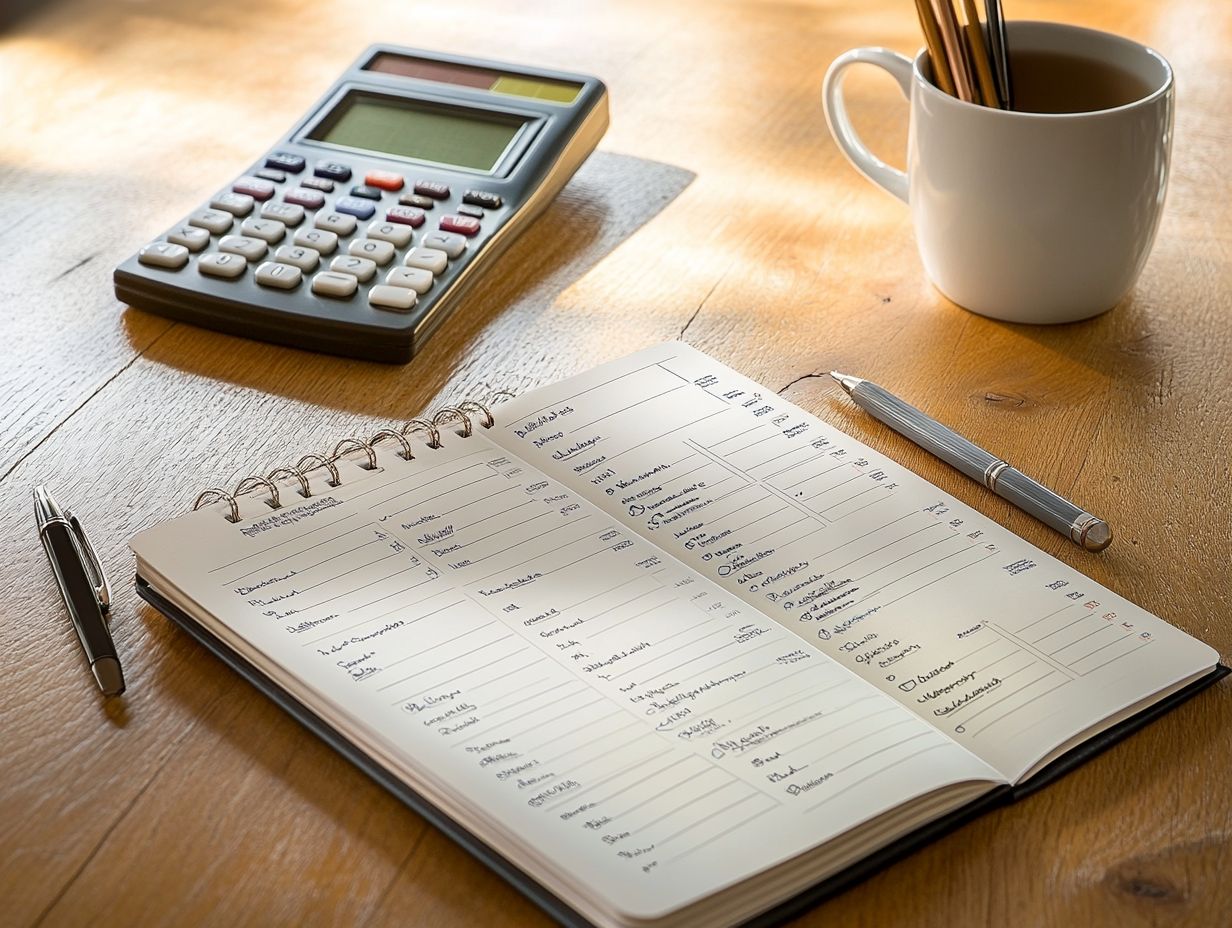What Are Discretionary Expenses?
Discretionary expenses hold significant importance in personal finance, enabling you to savor life beyond mere necessities.
Grasping what these expenses entail and how they integrate into your overall budget is vital for achieving financial stability. This guide will define discretionary expenses with real-life examples, delve into their impact on your financial goals, and offer practical tips for managing and reducing them.
Whether your aim is to save more or gain a clearer understanding of your spending habits, you ll find the strategies you need right here.
Contents
- Key Takeaways:
- Understanding Discretionary Expenses
- Why Managing Discretionary Expenses is Important
- Identifying and Tracking Non-Essential Spending
- Ways to Reduce Non-Essential Spending
- Balancing Non-Essential Spending with Savings
- Frequently Asked Questions
- What Are Discretionary Expenses?
- What is the difference between discretionary and non-discretionary expenses?
- What are some examples of discretionary expenses?
- How can I reduce my discretionary expenses?
- Why should I limit my discretionary expenses?
- Can discretionary expenses be necessary in certain situations?
Key Takeaways:

- Discretionary expenses are non-essential costs that can be reduced.
- Managing these expenses is crucial to reaching financial goals.
- Track and reduce discretionary expenses through smart budgeting.
Understanding Discretionary Expenses
Understanding discretionary expenses is essential for mastering money management, especially when crafting a household budget that balances both necessary and non-essential expenditures.
Discretionary expenses are those costs that aren’t strictly necessary, giving you the flexibility to make choices based on your available discretionary income the money you can spend after paying for essential needs like rent and groceries. This category can encompass everything from fancy meals and entertainment expenses to travel costs and team perks.
By thoroughly analyzing these expenses, you can uncover opportunities for savings and allocate your discretionary funds more effectively, even during challenging economic times.
Definition and Examples
Discretionary expenses are the costs that aren t vital for your basic living needs, granting you the freedom to decide how to allocate your discretionary income.
These expenses are distinct from essential costs like groceries, housing, and utilities that are necessary for your survival. While non-essential expenses can bring enjoyment, they aren t critical for daily functioning. They may include indulgences like fancy meals or the latest fashion trends.
For instance, you might choose to spend your discretionary income on a luxurious vacation to a tropical paradise instead of putting it away for future necessities. Consider a young professional who opts for concert tickets and streaming subscriptions over bolstering their emergency savings. This reflects a personal choice that strikes a balance between enjoyment and financial diligence.
When you understand these categories, you can take charge of your finances and make powerful decisions!
Why Managing Discretionary Expenses is Important
Managing your discretionary expenses is crucial for achieving your financial goals, as it significantly impacts your money coming in and going out and enhances your budgeting, especially during challenging financial times.
Tracking these expenses helps you make informed decisions that benefit your financial health. This approach enables you to allocate funds wisely toward essential expenses, savings plans, and ultimately, your long-term financial aspirations.
Impact on Budget and Financial Goals

The impact of discretionary spending on your household budget can be significant, influencing your ability to achieve financial goals while maintaining a healthy money flow.
When you manage these discretionary expenses effectively, you can craft a more balanced budget that caters to both your short-term desires and long-term aspirations. For instance, by keeping an eye on your monthly dining out expenses or subscription services, you might uncover opportunities to trim unnecessary costs. This allows you to redirect those funds toward savings or debt repayment.
This approach not only helps you meet immediate financial targets, like vacations or the latest gadgets, but also lays a robust foundation for future investments, enhancing your overall fiscal resilience.
Don t wait! Start analyzing your discretionary expenses today to boost your savings!
Ultimately, grasping the dual nature of discretionary spending enables you to make wiser financial decisions.
Identifying and Tracking Non-Essential Spending
Identifying and tracking non-essential spending is key to managing your money. It helps you gain deeper insights into your consumer behaviors and tailor your budgeting strategies accordingly.
By utilizing a range of tools and techniques for expense tracking, you can clearly identify areas where non-essential costs can be reduced. This not only enhances your budget allocation but also paves the way for improved financial stability.
Tools and Strategies for Tracking
With various options available, choose the tools that fit your lifestyle best. You can select from budgeting apps, spreadsheets, and expense management software to simplify the process of recording expenses.
These tools not only streamline expense tracking but also offer valuable insights into your spending habits. Utilizing effective budgeting methods, such as the 50/30/20 rule or zero-based budgeting, enables you to prioritize your needs and wants.
By categorizing your spending into essentials and non-essential costs, you can develop a clearer picture of where your money is going. This approach enables you to make informed decisions, ensuring you stay well within your financial limits.
Ways to Reduce Non-Essential Spending
Cutting back on non-essential spending is vital for your financial health and can pave the way for sustainable financial practices.
By employing effective cost reduction tactics and reassessing your spending habits, you can lower non-essential spending while maintaining a high quality of life.
Practical Tips for Cutting Costs

Practical tips for cutting costs can empower you to take charge of your financial planning and budget allocation.
Set clear spending limits to prioritize essential expenses while keeping unnecessary purchases in check. Reducing luxury items, even temporarily, can free up resources for more pressing financial goals.
Check your subscriptions. Many people find overlapping services that can be cut. Regular budget reviews enable you to continuously assess your spending habits, ensuring your money is allocated wisely.
Making informed choices about where to splurge and where to save enhances your overall financial stability and fosters a sense of control over your financial future.
Balancing Non-Essential Spending with Savings
Balancing non-essential spending with savings is essential for securing a sustainable financial future. This requires a thoughtfully structured budget that considers your discretionary income and sets wise spending limits.
This delicate balance allows you to indulge in non-essential purchases while committing to a solid savings plan, paving the way for long-term financial success.
Creating a Budget and Prioritizing Expenses
Creating a comprehensive budget and prioritizing your expenses is essential for effectively managing your discretionary income while ensuring you meet your savings goals.
Start by categorizing your expenses into essentials like housing, utilities, and food and non-essentials, which include entertainment and dining out. This helps you spot areas to cut back and distinguish between what you truly need and what can wait.
Maintaining a flexible approach is vital, as financial situations can fluctuate dramatically. For instance, if an unexpected expense arises, consider temporarily scaling back on non-essential spending to stay on track.
By regularly revisiting and fine-tuning your budget, you can improve your financial health and achieve greater peace of mind.
Frequently Asked Questions
What Are Discretionary Expenses?

Discretionary expenses are optional costs. Individuals or businesses choose to spend money on these.
What is the difference between discretionary and non-discretionary expenses?
Non-discretionary expenses are essential for daily living. Discretionary expenses, on the other hand, can be avoided or reduced.
What are some examples of discretionary expenses?
Examples of discretionary expenses include entertainment, vacations, and dining out. Luxury items and hobbies also fall into this category.
How can I reduce my discretionary expenses?
You can cut discretionary expenses by creating a budget. Focus on prioritizing your spending and finding cheaper alternatives for your favorite activities.
Why should I limit my discretionary expenses?
Limiting discretionary expenses helps you save money. It also prevents overspending and debt.
Can discretionary expenses be necessary in certain situations?
Yes, discretionary expenses can be necessary in some situations. For instance, buying a job interview outfit or a birthday gift for a friend.






